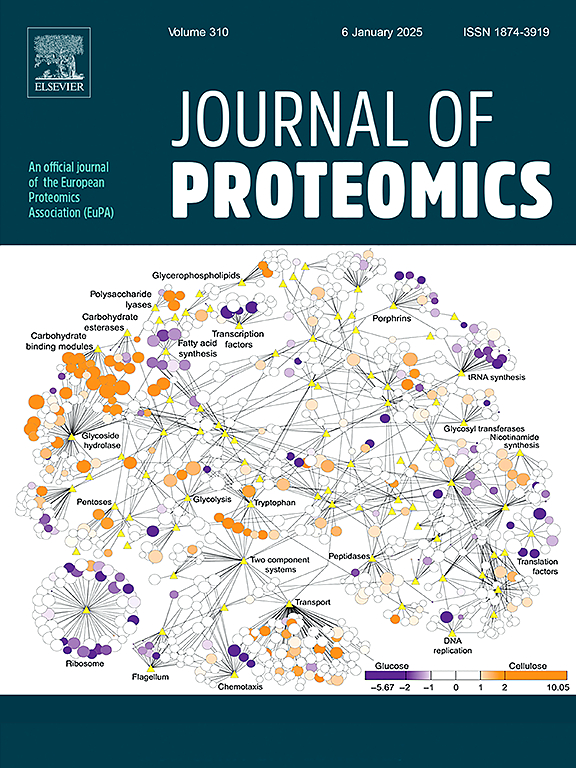Palaeoproteomic characterization of archaeological dental calculus reveals precarious periodontal health in pre-Roman Italy (7th–4th century BCE)
IF 2.8
2区 生物学
Q2 BIOCHEMICAL RESEARCH METHODS
引用次数: 0
Abstract
Periodontitis, a chronic inflammatory disease affecting the tooth-supporting structures, is a key indicator of oral health in palaeopathology. While poor oral hygiene, systemic diseases, and genetics are well-established contributors, the dietary impact has often been underestimated. Clinical studies, however, link diets high in fermentable carbohydrates and meat to inflammation. We investigated periodontal disease by analyzing interdental septa in 63 individuals from elite and non-elite groups in pre-Roman Italy (7th–4th centuries BCE), a period of social stratification, intensified agriculture, and increased cereal consumption. Macroscopic analysis was combined with proteomics of dental calculus from 33 individuals. Of the 1890 septa considered, 23 % displayed signs of periodontitis, with significantly higher rates in males. Prevalence increased with age in both sexes. Proteomic findings identified Porphyromonas gingivalis, a key periodontal pathogen, in 10 of 19 well-preserved dental calculus samples. While plaque accumulation is the main trigger for periodontitis, our findings highlight the dietary role in disease susceptibility. Carbohydrate-rich foods adhere to teeth and nourish bacteria, worsening periodontal conditions. At the same time, greater access to animal protein, particularly among emerging elites, may have contributed to inflammation. We propose that a proinflammatory diet may have been a major contributor to the proliferation of pathogenic oral microbiota.

考古牙石的古蛋白质组学特征揭示了前罗马意大利(公元前7 -4世纪)不稳定的牙周健康。
牙周炎是一种影响牙齿支撑结构的慢性炎症性疾病,是古病理学中口腔健康的关键指标。虽然口腔卫生不良、全身性疾病和遗传是公认的致病因素,但饮食的影响往往被低估。然而,临床研究将富含可发酵碳水化合物和肉类的饮食与炎症联系起来。研究人员分析了前罗马时代(公元前7 -4世纪)意大利精英群体和非精英群体的63名个体的牙间间隔,对牙周病进行了调查。对33例个体的牙结石进行宏观分析和蛋白质组学分析。在1890年的研究中,有23% %的人表现出牙周炎的迹象,其中男性的比例明显更高。男女患病率均随年龄增长而增加。蛋白质组学发现,在19份保存完好的牙结石样本中,有10份发现了牙龈卟啉单胞菌,这是一种重要的牙周病原体。虽然牙菌斑积累是牙周炎的主要诱因,但我们的研究结果强调了饮食在疾病易感性中的作用。富含碳水化合物的食物附着在牙齿上,滋养细菌,使牙周状况恶化。与此同时,更多地摄入动物蛋白,尤其是新兴精英群体,可能也导致了炎症。我们提出,促炎饮食可能是致病口腔微生物群增殖的主要因素。
本文章由计算机程序翻译,如有差异,请以英文原文为准。
求助全文
约1分钟内获得全文
求助全文
来源期刊

Journal of proteomics
生物-生化研究方法
CiteScore
7.10
自引率
3.00%
发文量
227
审稿时长
73 days
期刊介绍:
Journal of Proteomics is aimed at protein scientists and analytical chemists in the field of proteomics, biomarker discovery, protein analytics, plant proteomics, microbial and animal proteomics, human studies, tissue imaging by mass spectrometry, non-conventional and non-model organism proteomics, and protein bioinformatics. The journal welcomes papers in new and upcoming areas such as metabolomics, genomics, systems biology, toxicogenomics, pharmacoproteomics.
Journal of Proteomics unifies both fundamental scientists and clinicians, and includes translational research. Suggestions for reviews, webinars and thematic issues are welcome.
 求助内容:
求助内容: 应助结果提醒方式:
应助结果提醒方式:


